人教版初中英语九年级教案之unit4虚拟语气
- 格式:doc
- 大小:109.50 KB
- 文档页数:8
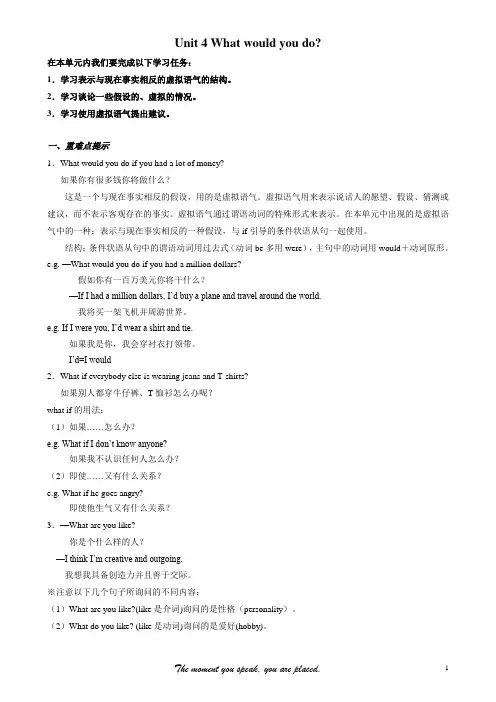
Unit 4 What would you do?在本单元内我们要完成以下学习任务:1.学习表示与现在事实相反的虚拟语气的结构。
2.学习谈论一些假设的、虚拟的情况。
3.学习使用虚拟语气提出建议。
一、重难点提示1.What would you do if you had a lot of money?如果你有很多钱你将做什么?这是一个与现在事实相反的假设,用的是虚拟语气。
虚拟语气用来表示说话人的愿望、假设、猜测或建议,而不表示客观存在的事实。
虚拟语气通过谓语动词的特殊形式来表示。
在本单元中出现的是虚拟语气中的一种:表示与现在事实相反的一种假设,与if引导的条件状语从句一起使用。
结构:条件状语从句中的谓语动词用过去式(动词be多用were),主句中的动词用would+动词原形。
e.g. —What would you do if you had a million dollars?假如你有一百万美元你将干什么?—If I had a million dollars, I’d buy a plane and travel around the world.我将买一架飞机并周游世界。
e.g. If I were you, I’d wear a shirt and tie.如果我是你,我会穿衬衣打领带。
I’d=I would2.What if everybody else is wearing jeans and T-shirts?如果别人都穿牛仔裤、T恤衫怎么办呢?what if的用法:(1)如果……怎么办?e.g. What if I don’t know anyone?如果我不认识任何人怎么办?(2)即使……又有什么关系?e.g. What if he goes angry?即使他生气又有什么关系?3.—What are you like?你是个什么样的人?—I think I’m creative and outgoing.我想我具备创造力并且善于交际。
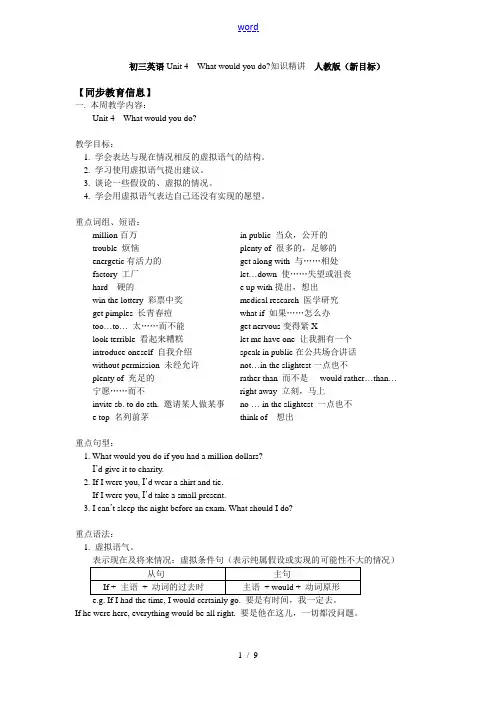
初三英语Unit 4 What would you do?知识精讲人教版(新目标)【同步教育信息】一. 本周教学内容:Unit 4 What would you do?教学目标:1. 学会表达与现在情况相反的虚拟语气的结构。
2. 学习使用虚拟语气提出建议。
3. 谈论一些假设的、虚拟的情况。
4. 学会用虚拟语气表达自己还没有实现的愿望。
重点词组、短语:million百万in public 当众,公开的trouble 烦恼plenty of 很多的,足够的energetic有活力的get along with 与……相处factory 工厂let…down 使……失望或沮丧hard 硬的 e up with提出,想出win the lottery 彩票中奖medical research 医学研究get pimples 长青春痘what if 如果……怎么办too…to…太……而不能get nervous变得紧Xlook terrible 看起来糟糕let me have one 让我拥有一个introduce oneself 自我介绍speak in public在公共场合讲话without permission 未经允许not…in the slightest一点也不plenty of 充足的rather than 而不是would rather…than…宁愿……而不right away 立刻,马上invite sb. to do sth. 邀请某人做某事no … in the slightest 一点也不e top 名列前茅think of 想出重点句型:1. What would you do if you had a million dollars?I’d give it to charity.2. If I were you, I’d wear a shirt and tie.If I were you, I’d take a small present.3. I can’t sleep the night before an exam. What should I do?重点语法:1. 虚拟语气。
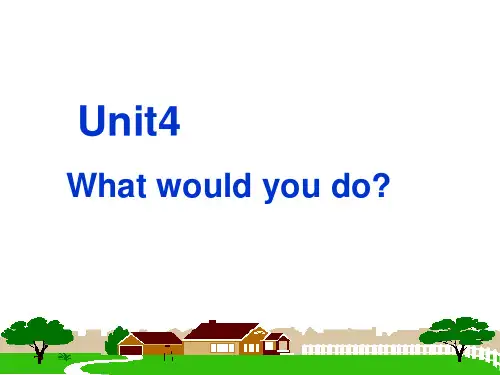
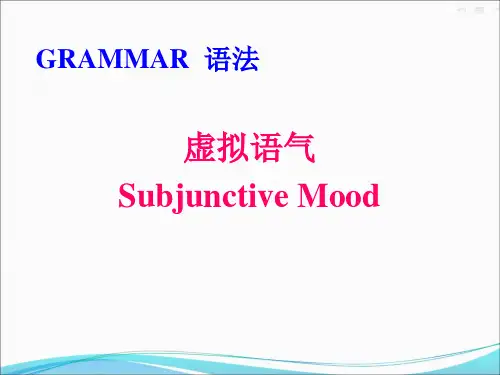
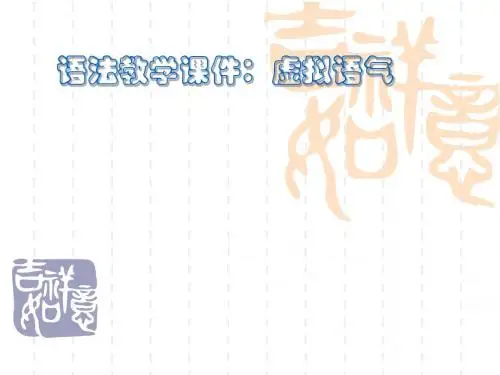
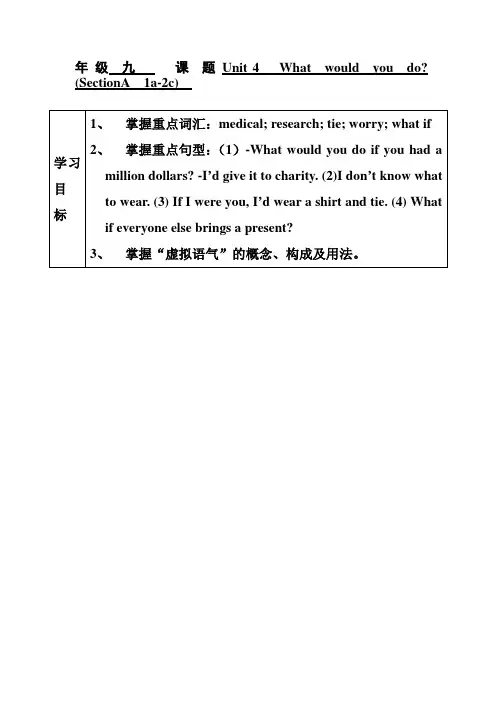
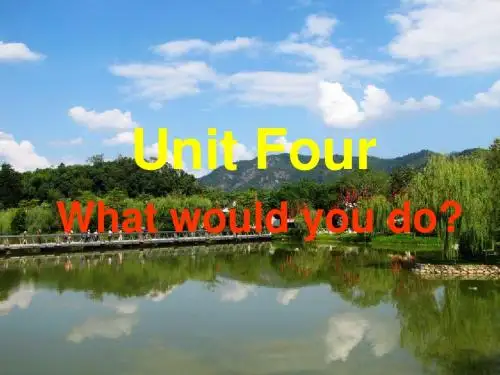
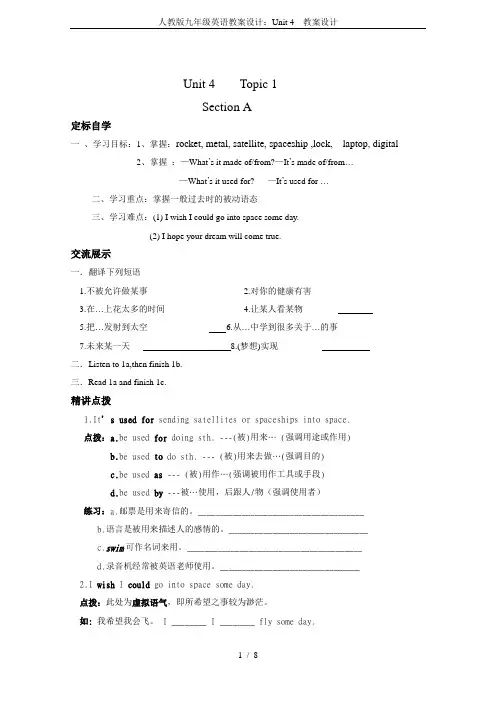
Unit 4 Topic 1Section A定标自学一、学习目标:1、掌握:rocket, metal, satellite, spaceship ,lock, laptop, digital2、掌握:—What’s it made of/from?—It’s made of/from…—What’s it used for? —It’s used for …二、学习重点:掌握一般过去时的被动语态三、学习难点:(1) I wish I could go into space some day.(2) I hope your dream will come true.交流展示一.翻译下列短语1.不被允许做某事____________________2.对你的健康有害______________3.在…上花太多的时间__________________4.让某人看某物________5.把…发射到太空_______________6.从…中学到很多关于…的事______________7.未来某一天___8.(梦想)实现__________二.Listen to 1a,then finish 1b.三.Read 1a and finish 1c.精讲点拨1.It’s used for sending satellites or spaceships into space.点拨:a.be used for doing sth. ---(被)用来… (强调用途或作用)b.be used to do sth. --- (被)用来去做…(强调目的)c.be used as --- (被)用作…(强调被用作工具或手段)d.be used by ---被…使用,后跟人/物(强调使用者)练习:a.邮票是用来寄信的。
______________________________________b.语言是被用来描述人的感情的。
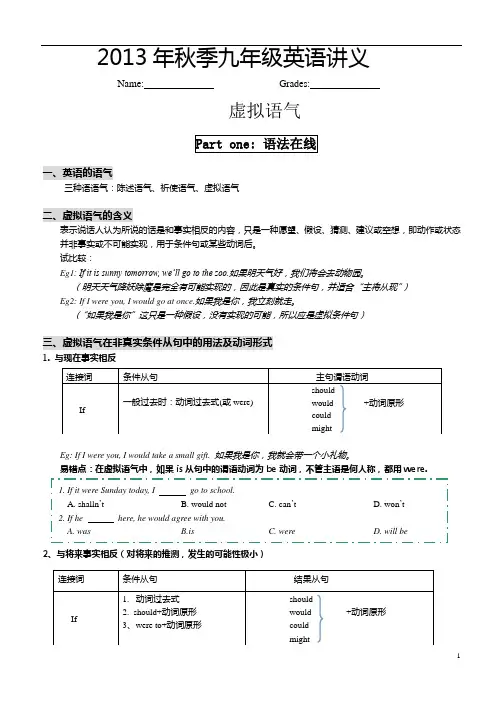
2013年秋季九年级英语讲义Name: Grades:虚拟语气一、英语的语气三种语语气:陈述语气、祈使语气、虚拟语气二、虚拟语气的含义表示说话人认为所说的话是和事实相反的内容,只是一种愿望、假设、猜测、建议或空想,即动作或状态并非事实或不可能实现,用于条件句或某些动词后。
试比较:Eg1: If it is sunny tomorrow, we’ll go to the zoo.如果明天气好,我们将会去动物园。
(明天天气降妖除魔是完全有可能实现的,因此是真实的条件句,并适合“主将从现”)Eg2: If I were you, I would go at once.如果我是你,我立刻就走。
(“如果我是你”这只是一种假设,没有实现的可能,所以应是虚拟条件句)三、虚拟语气在非真实条件从句中的用法及动词形式1. 与现在事实相反Eg: If I were you, I would take a small gift. 如果我是你,我就会带一个小礼物。
易错点:在虚拟语气中,如果is从句中的谓语动词为be动词,不管主语是何人称,都用were.2、与将来事实相反(对将来的推测,发生的可能性极小)Eg: If he should come here tomorrow, I could talk to him.如果他明天来这儿的话,我就跟他谈谈。
(事实:他明天来的可能性很小)If I were to see her tomorrow, I would tell her the truth.If you went there next time, you would see what I mean.3、表示与过去事实相反Eg: If I had got there earlier, I should have met her. 如果我能早点到那儿,我就会见到她。
(事实,我去晚了)一、精挑细选( )1. If he ___ you, he me.A. was, would helpB. is, will helpC. were, would helpD. were, helped( )2. What _____ you do if your little son cut himself by accident?A. willB. shallC. wouldD. must( )3. If your father _____ this, he would be angry.A. knowsB. knewC. had knownD. would know( )4. If I ___ you, I do this exercise in a different way.A.am, willB. be, wouldC. were, wouldD. will be, would( )5. If I were not busy, I _____.A. would comeB. had comeC. will comeD. would have come( )6. If John tomorrow, what would you do?A. were not to comeB. will not comeC. would not comeD. had not come( )7. If they had known him, to him?A.would they have talkedB. would they talkC.had they talkedD. they would talk( )8. If I lived in the city, I travel in crowded buses, but I to see lots of films.A. shall have to/shall be ableB. shall have to/am ableC. would have to/were ableD. would have to/would be able( )9. If my father here now, he tell me what to do.A. were, wouldB. were, willC. had, willD. is, will( )10. -I don’t know if Linda ___. -I think she if she is free.A. will come, will comeB. will come, comesC. comes, comesD. comes, will come( )11.Don’t open the door, if someone _____ the door,A. knockB. knocksC. will knockD. knocked( )12. If you are late for class, the teacher ___angry.A. is B was C will D will be( )13. Do you know if _____ back next week? If he _____ back, please let me know.A. he comes, will comeB. will he come, comesC. he will come, comesD. will he come, will come二、用动词的适当形式填空。
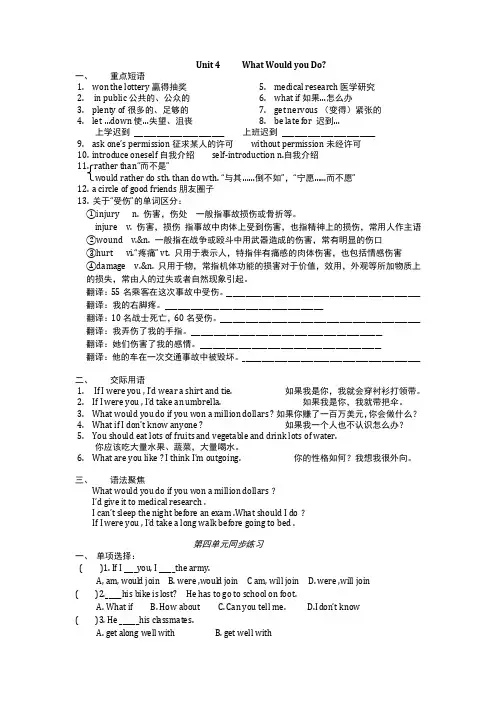
Unit 4 What Would you Do?一、重点短语1.won the lottery 赢得抽奖2. in public 公共的、公众的3.plenty of 很多的、足够的4.let …down使…失望、沮丧5.medical research 医学研究6.what if 如果…怎么办7.get nervous (变得)紧张的8.be late for 迟到…上学迟到____________________________ 上班迟到_____________________________9.ask one’s permission 征求某人的许可without permission 未经许可10.introduce oneself 自我介绍self-introduction n.自我介绍11. rather than“而不是”would rather do sth. than do wth. “与其……倒不如”,“宁愿…...而不愿”12.a circle of good friends 朋友圈子13.关于“受伤”的单词区分:①injury n. 伤害,伤处一般指事故损伤或骨折等。
injure v. 伤害,损伤指事故中肉体上受到伤害,也指精神上的损伤,常用人作主语②wound v.&n. 一般指在战争或殴斗中用武器造成的伤害,常有明显的伤口③hurt vi.“疼痛” vt. 只用于表示人,特指伴有痛感的肉体伤害,也包括情感伤害④damage v.&n. 只用于物,常指机体功能的损害对于价值,效用,外观等所加物质上的损失,常由人的过失或者自然现象引起。
翻译:55名乘客在这次事故中受伤。
____________________________________________________________ 翻译:我的右脚疼。
_________________________________________________翻译:10名战士死亡,60名受伤。
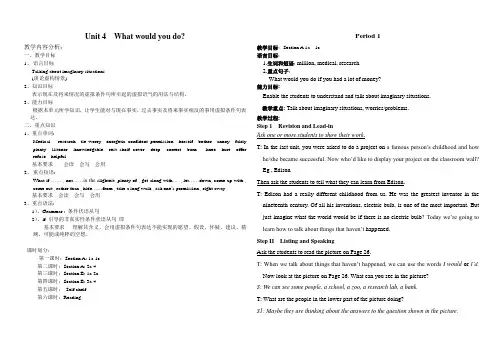
Unit 4 What would you do?教学内容分析:一、教学目标1、语言目标Talking about imaginary situations .(谈论虚构情景)2、知识目标表示现在及将来情况的虚拟条件句所引起的虚拟语气的用法与结构。
3、能力目标根据本单元所学知识,让学生能对与现在事实,过去事实及将来事实相反的事用虚拟条件句表达。
二、重点知识1、重点单词:Medical research tie worry energetic confident permission herself bother annoy fairly plenty listener knowledgable rest shelf cover deep correct burn knee hurt offer refuse helpful基本要求会读会写会用2、重点短语:What if ……., not……in the slightest ,plenty of , get along with….., let……down, come up with , come out , rather than , hide……from , take a long walk , ask one’s permission , right away .基本要求会读会写会用3、重点语法:1)、Grammar : 条件状语从句2)、if 引导的非真实性条件状语从句即基本要求理解其含义,会用虚拟条件句表达不能实现的愿望、假设、怀疑、建议、猜测、可能或纯粹的空想。
课时划分:第一课时:Section A: 1a-1c第二课时:Section A: 2a-4第三课时:Section B: 1a-2c第四课时:Section B: 3a-4第五课时:Self chelf第六课时:ReadingPeriod 1教学目标:Section A 1a---1c语言目标:1.生词和短语: million, medical, research2.重点句子:What would you do if you had a lot of money?能力目标:Enable the students to understand and talk about imaginary situations.教学重点: Talk about imaginary situations, worries/problems.教学过程:Step 1 Revision and Lead-inAsk one or more students to show their work.T: In the last unit, you were asked to do a project on a famous person’s childhood and how he/she became successful. Now who’d like to display your project on the classroom wall? Eg , EdisonThen ask the students to tell what they can learn from Edison.T: Edison had a really different childhood from us. He was the greatest inventor in the nineteenth century. Of all his inventions, electric bulb, is one of the most important. But just imagine what the world would be if there is no electric bulb? Today we’re going to learn how to talk about things that haven’t happened.Step II Listing and SpeakingAsk the students to read the picture on Page 26.T: When we talk about things that haven’t happened, we can use the words I would or I’d. Now look at the picture on Page 26. What can you see in the picture?S: We can see some people, a school, a zoo, a research lab, a bank.T: What are the people in the lower part of the picture doing?S1: Maybe they are thinking about the answers to the question shown in the picture.S2: The woman is reading a newspaper and they are all thinking of the answers to the question.T: Pretend you are the people in the picture, what would you do if you had a million dollars? S3: I’d buy a beautiful car.Write buy a beautiful car on the blackboard.S4: I’d build a research lab.S5: I’d give it to the Hope Project.S6: I’d travel around the world.S7: I’d give it to medical research.Ask for more ideas from the students. Write their ideas on the blackboard.buy a beautiful car,travel around the world, give it to the Hope Project, build a school for the poor children, build a library for our school, build a research labShow the following to the students and then ask them to practice in pairs.-What would you do if you had a million dollars?-I would (I’d) ____________.T: Now work in pairs and make dialogues.Sample dialogues:1.– What would you do if you saw someone stealing something?–I’d call the police.2.– What would you do if you lost your bike?–I’d buy a new one.3.– What would you do if you saw a girl crying in the street.– I’d help her find her mother.4.– What would you do if the teacher asked you to sing a song to the class?–I’d say yes. Step III ListeningAsk the students to listen to the recording and compare their answers with those in the recording.T: Next we’ll hea r a conversation about how to spend a million dollars. The recording will be played twice. For the first time, listen to get the order you hear.Play the tape for the first time.T: For the second time, please number the picture in the order you hear them.Play the tape for the second time. Then check the answers.Notes:1.hundred, thousand , million, billion (十亿)词前面有数词或several一词时要不能加s ,反之,则要加s 并与of 连用,表示数量很多如:several hundred/ thousand/ million/ billion people几百/千/百万/十亿人hundreds of trees 上百棵树2. 1.if 引导的非真实性条件状语从句,即虚拟语气通过动词形式的变化来表示说话人对发生的动作或存在的状态所持的态度或看法的动词形式称为语气,虚拟语气表示说话人所说的话不是事实,而是一种祝愿,建议或是与事实相反的假设等。
九年级英语Unit4虚拟语气的用法虚拟语气是一种动词形式,表示说话人的愿望、假设、猜测、建议等含义,虚拟语气所表示的含义不是客观存在的事实。
下面重点谈谈虚拟语气在条件句中的用法,虚拟语气条件句是用谓语动词的特殊形式来表示与现在、过去事实相反的情况或对将来发生的情况表示怀疑。
具体情况如下:1. 表示与现在事实相反的情况例如:If I were you , I'd get there earlier.如果我是你,我就早一点到那儿。
(事实是:我不是你,因此我没有早到那儿。
)If you went to bed earlier, you would not be so sleepy in the morning. 如果你早点儿睡觉, 早晨就不会这么困了。
(事实是:你经常晚睡, 所以早上觉得困。
)去事实相反的情况例如: If you had worked hard, you wouldn't have failed the exam . 如果你早用功, 你就不至于考试不及格了。
(事实是:你早没用功,所以考试失败了).表示与将来事实相反的情况例如: If it rained tomorrow, our picnic would be put off.如果明天下雨,我们的野餐就推迟。
(事实是:最近天气很好,下雨的可能性不大)If you should be late tomorrow, we would not wait for you.万一你明天迟到了, 我们就不等你了。
(事实是: 迟到是意料之外的事情注意。
)注意:用虚拟语气表示条件的条件从句, 可以放在主句前,也可以放在主句后, 但所表达的意义侧重点不同。
主句在前时,强调“结果”;从句在前时,强调“条件”。
巩固练习:一、单选题( ).1. If I were you ,I try my best.A. wouldB. shallC. hadD. will( ) 2. If I ten years younger, I very happy.A. am ; shall beB. were ; would beC. were ; shall beD. am ; would be( )3.If I to the moon, I would bring something unusual back to the earth.A. goB. goesC. wentD. will go( ) 4. If Jane here now , she would explain to us how to do it.A. beB. isC. wasD. were( ) 5. “You can ask your brother for help.” “He is not at home. If he , I .”A. is ; wouldB. is ; willC. were ; wouldD. were ; will二、用动词的正确形式填空6. If I ( be ) a teacher , I would not be so strict with my students.7. If he ( have ) time, I would come to help you .8. If she were not so busy , she ( come ) here with me .9. He ( go ) to bed if he had finished doing his homework in time .10. If it ( rain ) tomorrow , our picnic would be put off .答案:1.A 2. B 3. C 4. D 5. C 6. were 7. had 8. would come 9. would have gone 10. rained 解析:1—8 都表示与现在事实相反的情况,条件从句的谓语动词用动词的过去式( be 一般用were ),主句的谓语动词用would 或 should + 动词原形。
九年级unit4虚拟语气知识点九年级英语Unit41. if引导的非真实性条件状语从句即虚拟语气通过动词形式的变化来表示说话人对发生的动作或存在的状态所持的态度或看法的动词形式称为语气,虚拟语气表示说话人所说的话不是事实,而是一种祝愿,建议或是与事实相反的假设等。
If引导的条件状语从句分为真实和非真实条件句,非真实条件句应用虚拟语气。
如果要表示与现在或将来事实相反时,其虚拟语气结构为:句型条件从句主句谓语动词形式动词过去式(be动词用were)would+动词原形即:(从句)if +主语+动词过去式(b e动词用were), 一般过去时(主句)主语+would+动词原形过去将来时如:If I had time, I would go for a walk.如果我有时间,我就会去散步。
(事实上我现在没有时间)If I were you, I would take an umbrella.假如我是你的话,我会带上雨伞。
(事实上我不是你)I would say no if someone asked me to be in a movie. 假如有人请我当电影演员,我会表示拒绝。
(事实上瑞没有人请我当电影演员)2. pretend to do sth.假装做某事I pretended to sleep just now.pretend +从句假装… I pretended that I fell asleep.3. be late for 迟到如:I am late for work/ school/ class/ party.4. a few与 a little的区别,few与little的区别⑴a few一些修饰可数名词a little一些修饰不可数名词两者表肯定意义如:He has a few friends. 他有一些朋友。
There is a little sugar in the bottle. 在瓶子里有一些糖。
Unit 4 What would you do第一课时单元分析与提示教学目标语言目标:1、掌握虚拟条件句,注意动词的形式;2、熟练运用以下句型和词汇A.What would you do if you found a million dollars ?I’d give it to medical research. / If I were you, I’d buy some books.B. I can’t sleep before an exam. What shoul d I do?If I were you, I’d take a long walk before going to bed.3、词汇:charity, lottery, million, pimple, nervous, shy, creative, outgoing, confident, energetic, present, shirt, tie, medical research, give a speech, in public, introduce…to…, in the s lightest, would rather, let sb. down,认知目标学生能运用虚拟语气来讨论一些虚拟的情景并且能针对面临的问题给出建议。
情感目标通过对一些情景的反应,培养学生的应变能力;树立关爱他人的意识,形成开朗乐观的性格。
教学重、难点虚拟语气表示说话人的愿望、假设、猜测或建议,而不表示客观存在的事实,虚拟语气通过谓语动词的特殊形式来表示。
虚拟条件句谓语动词的构成形式:注意:主句中的should通常用于第一人称,would可用于任何人称,同时也可根据意思用情态动词could, might等代替should, would.1)表示与现在事实相反,例如:If I were you, I should stay at home.If the peasants could farm the land themselves, food production would be much higher.2)表示与过去事实相反,例如:If you had come yesterday, you would have met him.3)表示与将来事实相反,例如:If you came tomorrow, we would have the meeting .4)当条件状语从句表示的行为和主句表示的行为所发生的时间不一致时,动词的形式要根据它表示的时间来调整。
Unit 4 What would you do?语法1. if 引导的非真实性条件状语从句 即 虚拟语气if 引导的条件状语从句分为真实和非真实条件句,非真实条件句应用虚拟语气。
虚拟语气表示说话人所说的话不是事实,而是一种祝愿,建议或是与事实相反的假设等。
如果要表示与现在或将来事实相反时,其虚拟语气结构为:即:(从句) if + 主语 + 动词过去式 (be 动词用were), 一般过去时(主句) 主语 + would + 动词原形 过去将来时如:1) If I __had________ time, I ___would________ ___go______for a walk.如果我有时间,我就会去散步。
(事实上我现在没有时间)2) If I ___were ________ you, I ___would________ ___bring_______an umbrella.假如我是你的话,我会带上雨伞。
(事实上我不是你)3) I __would________ __say_______ no if someone ___asked_______ me to be in a movie. 假如有人请我当电影演员,我会表示拒绝。
(事实上没有人请我当电影演员)2. 宾语从句 宾语从句在复合句中作主句的宾语。
① 由连接词 + 主语 + 谓语 构成常由下面的一些词引导:② 由that 引导 表示陈述意义 that 可省略He says (that) he is at home. 他说他在家里。
③ 由if , whether 引导 表示 一般疑问意义(带有是否、已否、对否等)I don ’t know if / whether Wei Hua likes fish. 我不知道韦华是否喜欢鱼。
④ 由 连接代词、连接副词(疑问词) 引导 表示特殊疑问意义Do you know what he wants to buy? 你知道他想要买什么吗?⑤ 从句时态要与主句一致句 型 条件从句 主 句 谓语动词形式 动词过去式 (be 动词用were) would + 动词原形当主句是一般现在时,从句根据情况使用任何时态He says (that ) he is at home. 他说他在家里。
一、授课目的与考点分析:目的:学会使用虚拟语气谈论假定的事情,掌握虚拟条件句的结构和用法考点分析:if引导的虚拟语气 should用于提建议二、授课内容:1. 虚拟语气(1) 意义:虚拟语气表示说话人所说的话只是一种主观愿望和假想虚拟的情况或与事实相反的假设。
(2) 用法:常用于条件句或某些动词之后,若用于条件句中,主句和从句的谓语动词要根据所描述的情况发生变化。
2. 虚拟语气在非真实条件从句中的应用(1) if条件句可分为真实条件句和虚拟条件句。
真实条件句表示在假设的条件下,有可能实现的情况。
真实条件句遵循“主将(一般将来时)从现(一般现在时)”原则。
Eg: We will go on vacation if it is sunny tomorrow.主将从现(2) 虚拟语气句分为三种,即:与现在事实相反的情况,与过去事实相反的情况和与将来事实相反的情况。
现阶段我们只要掌握“与现在事实相反”的虚拟条件句既可。
其结构如下:虚拟类别主句从句与现在事实相反主语 + would/ could/ should/ might + 动词原形if + 主语 + 动词过去式(当谓语动词是be时,要用were)Eg: If I were a bird, I would fly freely in the sky. 如果我是一直小鸟,我会在天空中自由翱翔。
If he had enough money, he’d buy a car. 如果他有足够钱的话,他会买辆车。
3. hundred, thousand, million和billion等词前面与具体数词one, two或several, some, many等连用时要用单数形式。
Eg: There are two thousand students in our school. 我们学校有2000名学生。
注:(1) 当hundred, thousand, million, billion等指的不是确切的数字时,则必须用复数形式,而且后面接介词of,意为“数以……计的”。
Unit 4 What would you do?在本单元内我们要完成以下学习任务:1.学习表示与现在事实相反的虚拟语气的结构。
2.学习谈论一些假设的、虚拟的情况。
3.学习使用虚拟语气提出建议。
一、重难点提示1.What would you do if you had a lot of money?如果你有很多钱你将做什么?这是一个与现在事实相反的假设,用的是虚拟语气。
虚拟语气用来表示说话人的愿望、假设、猜测或建议,而不表示客观存在的事实。
虚拟语气通过谓语动词的特殊形式来表示。
在本单元中出现的是虚拟语气中的一种:表示与现在事实相反的一种假设,与if引导的条件状语从句一起使用。
结构:条件状语从句中的谓语动词用过去式(动词be多用were),主句中的动词用would+动词原形。
e.g. —What would you do if you had a million dollars?假如你有一百万美元你将干什么?—If I had a million dollars, I’d buy a plane and travel around the world.我将买一架飞机并周游世界。
e.g. If I were you, I’d wear a shirt and tie.如果我是你,我会穿衬衣打领带。
I’d=I would2.What if everybody else is wearing jeans and T-shirts?如果别人都穿牛仔裤、T恤衫怎么办呢?what if的用法:(1)如果……怎么办?e.g. What if I don’t know anyone?如果我不认识任何人怎么办?(2)即使……又有什么关系?e.g. What if he goes angry?即使他生气又有什么关系?3.—What are you like?你是个什么样的人?—I think I’m creative and outgoing.我想我具备创造力并且善于交际。
※注意以下几个句子所询问的不同内容:(1)What are you like?(like是介词)询问的是性格(personality)。
(2)What do you like? (like是动词)询问的是爱好(hobby)。
(3)What do you look like?(like是介词)询问的是外貌(appearance)。
4.Social situations don’t bother you in the slightest.(1)bother 打扰,困扰;麻烦e.g. Don’t bother me with stupid questions.不要问一些愚蠢的问题来烦我。
I’m sorry to bother you.对不起,打扰了。
Don’t bother ab out/with it.不要为那件事烦恼。
(2)not …in the slightest =not… at all一点也不,毫不e.g. He didn’t seem to mind in the slightest.他似乎毫不在意。
5.You like talking to one or two people rather than to a group.你喜欢对一两个人讲话而不是是对一群人讲话。
rather than =instead of 意为“而不是”,用作连词,连接两个并列的成分。
e.g. I think I’ll have a cold drink rather than coffer.我想要冷饮,不要咖啡。
Why didn’t you ask for help, rather than trying to do it on your own?你为什么非得自己干而不请人帮忙?You would also rather stay at home and read a good book than go to a party.你还会宁愿呆在家里看一本书而不愿去一个聚会。
6.一些短语和词组:(1)worry about 为……而担心e.g. Don’t worry about me. I’ll look after myself.别为我担心,我会照顾我自己。
(2)e.g. He made a speech on peace.他以和平为题发表演讲。
(3)without permission 没经过允许with permission 经过许可(4)let sb. down 让某人失望=make sb. disappointed=frustrate sb.(5)come up with想出,找出(答案、计划)(不可用于被动语态)e.g. You’ve come up w ith a good idea.你想出的主意太好了。
6.the rest of the students 其余的学生rest n. 其余,其他,rest常用作the rest of,其后可接可数名词或不可数名词。
e.g. You can eat up the rest of the food.你可吃光剩下的食物。
Mary is out. The rest of the girls are at home.玛丽外出了,其余的女孩在家。
二.语法重点(Grammar Focus)虚拟语气1. 语气就是我们常说的说话人说话的口气。
在汉语中,语气是由说话人说话的语调、情节等等表现出来的,动词没有任何变化。
而在英语中,除了语调之外,最主要的是动词发生变化而表示不同的语气。
在英语中语气分为三类:陈述语气、祈使语气、虚拟语气。
2. 虚拟语气:如果我们所说的不是事实,也不是要求、命令、劝告等,而只是一种假设、愿望、建议或是一种实现不了的空想就用虚拟语气。
3. 虚拟语气常用在条件句中,及其他一些从句中。
注意:条件句分两种,真实条件句和虚拟条件句。
只有在虚拟(非真实)条件句中,才用虚拟语气,而在真实条件句中,要用陈述语气。
请比较:(1)If it is sunny tomorrow , we’ll go to the zoo.如果明天天气好,我们将会去公园。
在这句话中,明天天气好是完全有可能实现的,并非虚拟、幻想,因此是真实条件句。
在本句中,适用“主将从现。
”(2)If I were you , I would go at once.(如果我是你的话,我立刻就走。
)在这句话中,条件句,“如果我是你”,但事实上,我不可能成为你,这只是假设的情况,没有实现的可能。
当条件实现的可能性很小,甚至可以说没有时,就需要用虚拟语气来表示,动词发生了变化。
4. 在虚拟语气中,句子动词的时态比真实条件句中的时态后退一步即:现在时→过去时(该用现在时时,用过去时)过去时→过去完成时(该用过去时时,用过去完成时)将来时→过去将来时(该用将来时时,用过去将来时)过去将来时→过去将来完成时(该用过去将来时时,用过去将来完成时)在这一单元中,我们只要求初步接触虚拟语气的用法及结构,学习表示与现在事实相反的情况下如何体现虚拟语气。
5. “表示与现在事实相反的情况”的虚拟语气请看例句:If I were you , I would take a small present.如果我是你的话,我就带上一个小礼物。
(注:在这个句子中,即“If I were you 中,一定用were ,而不能用was”)(这句话中,是与现在的事实相反,“现在如果我是你的话。
”事实上,我不可能成为你,也就根本没有实现的可能)请大家注意主句与条件从句中动词时态的变化。
形式:从句(用过去时)主句(用过去将来时)If +主语+主语+was。
又如:If I won a million dollars, I’d give it to charities.如果我赢了一百万英镑,我要捐给慈善机构。
(在此句中,If条件句中,动词用过去式won,主句则用should / would 加动词原形。
现实情况是我没赢一百万英镑;虚拟的情况是假如我赢了一百万,这种虚拟是不可能变成现实的,因此用虚拟语气。
)6. 虚拟语气的疑问式,除了动词相应的变化外,其他变化与陈述语气相同如:(1)What would you do if you were in the lion’s cage ?如果你在狮子笼里,你会怎么做?(疑问词在句首,主句中助动词提前,从句跟在主句后面。
)If I were in the lion’s cage, I’d call for help.如果我在狮子笼里,我会大呼救命。
If I were in the lion’s cage . I’d get out fast.如果我在狮子笼里,我会迅速出来。
(2)What would you do if you won the lottery ?如果你赢了抽奖,你会做什么?I’d give it to medical research.我会用于医学研究。
Or I’d put it in the bank.我会存到银行。
Or If I were a millionaire , I would buy a big house in the country.如果我是百万富翁,我就在乡村买座大房子。
关于虚拟语气,我们要学习的东西还有许多,同学们会在今后的学习当中,慢慢接触到。
单项选择A.找出与划线部分意思相同或相近的一项。
1.—Are you tired?—Not in the slightest.A.Not a little B.Not a few C.Not at all D.Not a lot2.There are plenty of books in our school library.A.a lot B.much C.number of D.lots of3.You always come up with good solutions to people’s problem.A.catch up with B.think of C.think over D.keep up with4.I must study hard. I can’t let my parents down.A.make, angry B.help, anymoreC.make, disappointed D.take care of5.He is busy. Don’t bother him.A.trouble B.worry about C.be afraid of D.askB.选择正确的答案完成句子6.What would you do if you _____ free this afternoon?A.are B.will be C.were D.had7.If I _____ you, I _____ go to the movie tonight.A.am, will B.were, would C.was, will D.were, can8.She is going to a party, but she does n’t know _____.A.how to wear B.what to wearC.what should she wear D.what to wear clothes9.—What is she like?—_____.A.She is active and outgoing B.She likes EnglishC.She looks like a teacher D.She feels like having a walk10.They preferred _____ at home rather than _____ the movie.A.staying; going to B.to stay, go to C.to stay, going to D.stay, go to汉译英:根据汉语意思完成句子,一空一词。